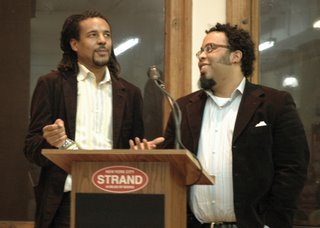elegies, haiku, & pork

A stellar duo of writers showed up at the Strand bookstore in New York City Thursday night. Colson Whitehead & Kevin Young, former Harvard classmates who have already published nine books between them, read from their latest work to a packed room. Young, whose just-issued poetry collection, "For the Confederate Dead" (Knopf, 2007) references the famous "For the Union Dead," explained to the crowd that his middle name is Lowell & that he'd always intended to address this via writing one day. The book contains elegies to Gwendolyn Brooks, Phyllis Wheatley, & Young's friend & author Philippe Wamba, who died in an automobile accident in Kenya at age 31; "April in Paris" describes Lionel Hampton's last weekend in concert in Paris. Young started off, however, with a black binder that held new poems such as "Ode to Pork" & "I Walk the Line" (of the latter he complained, "The trouble with movies is that they often steal the best lines"). The poet's trademarked wordplay did not take long to surface: "I am the African-American sheep in the family," he intoned in mock seriousness during one piece.
Colson Whitehead, lean, tall, & severe while Young is plump, of average height, & given to frequent smiles, nevertheless opened with a dryly hilarious essay proposing an alternate use for the Empire State Building: storage for all the fiction writers, with demarcated floors for realists, those undergoing a sophomore slump, & huge successes like John Grisham. "A loud alarm goes off every couple of hours or so to warn you when someone starts a new literary journal," he read. And the poets? They're in Madison Square Garden--"where else would they all fit?" "Apex Hides the Hurt" (Doubleday, 2006; Anchor paperback, 2007), Whitehead's third novel, tells the story of a nomenclature consultant--one who can create the perfect name for a product--& is composed of clipped, clever sentences that expertly reflect its protagonist. He (ironically unidentified throughout) is hired to settle a dispute in a Midwestern town called Winthrop. Is the name good enough, or should it be changed to New Prospera (as suggested by a white software tycoon) or revert to the original Freedom, chosen by the former slaves who founded the town?
In the question & answer session that followed the reading, the authors spoke on topics ranging from inspiration to adaptation (Young's "Black Maria" is being staged, & Whitehead's "The Intuitionist" has been optioned "several times, but no one's been able to figure out how to film it yet"), but they also gently elbowed each other as encouragement to share personal reminiscences, a number of which ended with "and then we got drunk." Finally, a big revelation: Colson Whitehead composes haiku. At the audience's request, he grinned slightly & recited one about... "Little House on the Prairie."



0 Comments:
Post a Comment
<< Home